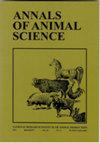Origanum majorana essential oil ameliorated the behavioral, biochemical, physiological and performance perturbations induced by aflatoxin B1 in growing rabbits
IF 2.2
4区 农林科学
Q2 AGRICULTURE, DAIRY & ANIMAL SCIENCE
引用次数: 0
Abstract
Abstract The current study assessed the benefits of marjoram essential oil (MEO) in reducing the aflatoxin B1 (AFB1) toxicity in growing rabbits. Forty-eight rabbits, aged 4 weeks, were randomly assigned to four groups (4 replications of 3 rabbits / replicate) as follows: BD group (control); AFB1 group (supplemented with AFB1 0.3 mg/kg diet); MEO-supplemented group (1 g MEO/kg diet); AFB1 + MEO group (AFB1 0.3 mg/kg diet + 1 g MEO/kg diet). AFB1 exposure resulted in reduction of rabbit growth and total protein and albumin content in serum; increased liver function related enzymes (ALP, ALT and AST); induced oxidative stress displayed by lower level of antioxidant enzymes (CAT and GSH), increased biomarkers of DNA and lipid oxidative damage with significant upregulation of the tumor suppressor protein interferon-γ, interleukin 1β, tumor necrosis factor- α and heat shock protein-70 when compared to the control (P < 0.05). Moreover, exposure to AFB1 increased the bioaccumulation of AFB1 residues in rabbit liver. Supplementation of MEO in the AFB1-exposed rabbits alleviated all of its negative effects. In conclusion, dietary addition of 1 g MEO could effectively ameliorate the adverse impacts of AFB1 on rabbit growth; enhanced their antioxidants and reduced oxidative stress and inflammatory response indicators, as well as the AFB1- residues in liver.牛至精油改善黄曲霉毒素B1对生长兔的行为、生化、生理和性能的影响
摘要本研究评估了马郁兰精油(MEO)降低生长家兔黄曲霉毒素B1 (AFB1)毒性的作用。选取48只4周龄家兔,随机分为4组(4个重复,每个重复3只):BD组(对照组);AFB1组(添加AFB1 0.3 mg/kg日粮);MEO添加组(1 g MEO/kg日粮);AFB1 + MEO组(AFB1 0.3 mg/kg日粮+ 1 g MEO/kg日粮)。AFB1暴露导致家兔生长和血清总蛋白、白蛋白含量降低;肝功能相关酶(ALP、ALT和AST)升高;与对照组相比,抗氧化酶(CAT和GSH)水平降低,DNA和脂质氧化损伤生物标志物升高,肿瘤抑制蛋白干扰素-γ、白细胞介素1β、肿瘤坏死因子- α和热休克蛋白-70水平显著上调(P < 0.05)。此外,暴露于AFB1增加了AFB1残留物在兔肝脏中的生物积累。在afb1暴露的家兔中补充MEO可减轻其所有负面影响。由此可见,饲粮中添加1 g MEO可有效改善AFB1对家兔生长的不利影响;增强抗氧化剂,降低氧化应激和炎症反应指标,以及肝脏中AFB1-的残留量。
本文章由计算机程序翻译,如有差异,请以英文原文为准。
求助全文
约1分钟内获得全文
求助全文
来源期刊

Annals of Animal Science
农林科学-奶制品与动物科学
CiteScore
4.00
自引率
5.30%
发文量
138
审稿时长
6-12 weeks
期刊介绍:
Annals of Animal Science accepts original papers and reviews from the different topics of animal science: genetic and farm animal breeding, the biology, physiology and reproduction of animals, animal nutrition and feedstuffs, environment, hygiene and animal production technology, quality of animal origin products, economics and the organization of animal production.
 求助内容:
求助内容: 应助结果提醒方式:
应助结果提醒方式:


